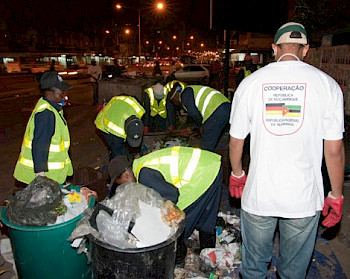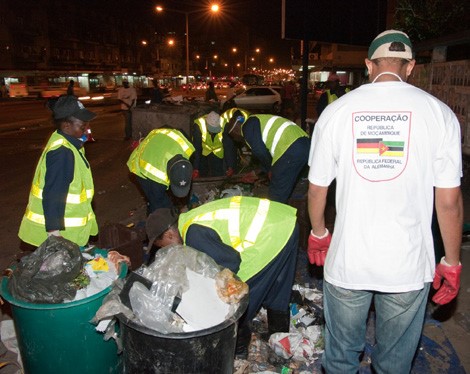Location: Maputo City, Mozambique
Keywords:
"Waste management framework"
" Innovative financing"
" Stakeholder involvement"
USING ECONOMIC INSTRUMENTS TO IMPROVE WASTE MANAGEMENT SERVICES
The project applied a revenue collection system which covered more than 90% of households as of 2011 by adding the waste fee to the electricity bill, graduated according to electricity consumption (se below). This proved to be an effective collection method. The Maputo City Council had identified household waste fee as an important instrument to improve the financial standing in solid waste management. The project was executed with the aim of improving cost recovery and ensuring the economic viability of the waste management systems as the fees to cover costs of solid waste management were not adequate and the authorities in charge were unable to collect the existing fees effectively.
The project used a calculation model tool for the implementation of the various economic instruments to produce the necessary results for the strategy on financial sustainability. The model used population figures, estimated waste quantities and planned service provision level for all existing waste streams to calculate the total expected costs of service provision for any given year within the planning horizon. Also, the calculations used a system analysis of collection and transportation costs for different collection types based on regional/international experiences and local calculations. It is important to highlight that the most critical points are the calculation of productivity (besides quantity of waste collected in ton/day for a given equipment or collection system) and financial parameters such as amortization time and capital costs. The main economic instruments applied in this case study are; Household Waste Fees, Proof of Service (for large scale non-household waste producers), Revenue from commercial services provided by Maputo City Council, Disposal Fees for the current and future disposal sites and Specific Service Related Fees. 
In the second phase, the model was enumerated according to service delivery objectives and designed for long-term analysis with variable parameters such as service coverage, unit costs and specific revenue calculation. Thus, the model brought a service related analysis of cost coverage. And in the last stages, the model was evaluated, adjusted, improved and actualised according to proper experience and availability of new data. It is important to note that the model was used as decision-making tool on strategic level and is still in use by Maputo City Council to analyse the future financial situation of the sector and decide on waste fee increases. As such, it was a long-term investment to create the model. The continuity of the tool was also part of the agreement between Maputo City Council and World Bank thus such a condition is an indicator for the approval and success of the project.
In execution of the project, it was observed that public tender processes and internal cost monitoring provides further input for improving the quality of data and calculation parameters as such the result is a linear cash flow analysis of the total cost of the solid waste management system for each year of the strategy. The method of collecting the fee is also as important as the fee itself. A major obstacle in the course of project execution was the non-availability of comparable data from proper or similar regional experience which allowed for validating assumptions and controlling the final results. As a result of this, alongside poor quality of data the margin of error of calculation was increased. Hence, some of the cost calculations had to be adjusted over time for more accuracy.
The fees collected over the eletricity bill were graduated according to electricity consumption as a measure for the activity rate of the household. For the Maputo contect, the fees were [or just the different electricity levels used]
From year 2002 – 2010, Deutsche Gesellschaft für Internationale Zusammenarbeit (GIZ) GmbH supported the Maputo City Council in the implementation of a sustainable waste system via the Technical Assistance Project AGRESU (Assistance to Solid Waste Management in the Greater Maputo Area). Other relevant actors involved include; Electricidade de Moçambique(EDM) and the general public Also, in 2007, World Bank was integrated into the project via the commencement of Municipal Development Program (ProMaputo) to design and implement a joint approach on solid waste management.
Lessons learnt: Results of public tender processes and internal cost monitoring give further input to improve the quality of data and calculation parameters.
In conclusion, the experience from the Maputo project displayed that the goal of adequate waste service provision can only be accomplished when the instrument is suitable and locally apt technical solution, thus these will sustain the services and the capacity of the institution to implement and sustain
